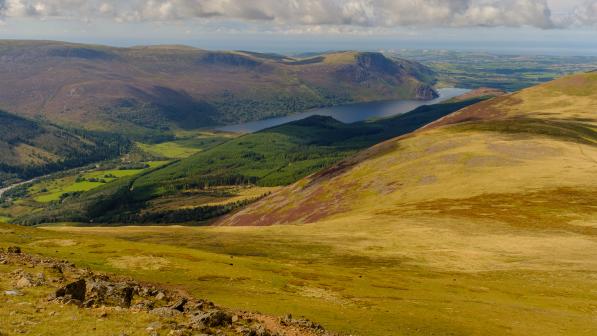Dartmoor camping legal challenge: how could it affect cycling?

Over the past couple of days a court case has been underway challenging the right of the public to camp on Dartmoor - currently the only place in England where wild camping is legal.
There has been a long-accepted right of access for wild camping on the moors of Dartmoor National Park. However, a local landowner has challenged the origin of this right, asserting that he should be able to move people on if he chooses.
The thrust of the debate is that the 1985 Dartmoor Commons Act gives a statutory right of access for the purposes of open-air recreation on foot and on horseback. The National Park Authority, in support of camping, argues that open-air recreation has a broad definition, and that camping is a non-harmful way to enable people to exercise that right (such as on a longer backpacking walk).
The landowner’s position is that if the act had meant that, then it would have specified it, and just because wild camping has been tolerated for many years it does not make it a public right.
If this legal challenge is successful, then the situation will become the same as the rest of England: people would need the landowner’s permission to camp, otherwise it would count as a civil trespass. We’ll have to wait until the New Year to find out the verdict.
One protected and the other penalised
There’s an interesting comparison here between camping and cycling.
There is no specific right to wild camp, and there is also no right to cycle on the moor except on the few miles of bridleway and byway. However, camping is being fiercely protected, whereas cycling off rights of way is a criminal offence under Dartmoor’s byelaws – even on the surfaced Land Rover tracks which criss-cross the moor.
The question from the cycling community might be: why is one form of open-air recreation being penalised and the other protected? You’d expect there would be some form of clear and articulated justification, but so far we haven’t had one.
Late last year, Dartmoor National Park Authority triggered a review of byelaws regulating access to the commons. Cycling UK responded to the consultation arguing that the byelaws were not a reasonable or proportionate approach to managing off-road cycling issues in a National Park. We also highlighted the work of Cycling UK members in protesting the introduction of these byelaws almost 25 years ago.
A year on, the authority has recently put forward a number of minor amendments that it is ‘minded to make’ to its byelaw proposals. Bottom line up front: they’ve done nothing to allay any of our concerns, and the new byelaws look much like the old ones.
The proposed byelaw relating to cycling currently reads: “No person shall without reasonable excuse drive, ride or propel any mechanically propelled vehicle or any pedal propelled vehicle on any part of the Access Land other than on a highway where there is a right of way for that class of vehicle.”
The byelaw regulating cycling criminalises all cycling away from bridleways and byways, even on surfaced Land Rover tracks and historic tramways
Kieran Foster, Cycling UK off-road adviser
Not reasonable or proportionate
If the byelaw regulating cycling was focused on dealing with the issue of cyclists causing damage or disturbance in specific highly sensitive areas, or causing identifiable harm or public nuisance – as, it’s important to point out, the existing byelaws relating to camping, dogs, protection of wildlife, kites and music all attempt to do – we would have no objection.
However, as drafted, it criminalises all cycling away from bridleways and byways, even on surfaced Land Rover tracks and historic tramways. Such an extensive prohibition – extending to more than 27,000 acres – is not reasonable or proportionate in our view, when it doesn’t relate to actual evidence of harm.
This is especially true for a National Park, a designation created to promote open-air recreation and enjoyment of the outdoors.
It’s important to emphasise that the byelaw review doesn’t present an opportunity to increase access rights for cycling. However, just because there isn’t a ‘legal right’ to do something, it shouldn’t automatically make it a criminal offence.
To quote a seminal piece of constitutional case law: “England, it may be said, is not a country where everything is forbidden except what is expressly permitted: it is a country where everything is permitted except what is expressly forbidden.”
We also have concerns over the council’s Equality Impact Assessment, because it only assesses the changes in the byelaws, not the full byelaws. We think this is inadequate. The core byelaws were issued in 1989, more than 20 years before the Equality Act, so they have never undergone a formal equality assessment. We believe this is unacceptable.
There is extensive evidence that cyclists represent a different demographic profile from other users. The recent expansion in e-cycle use has shown how cycling can help people stay active for longer, and bring people back into active lifestyles and improve their health and wellbeing and connection with nature.
The impact assessment has failed to consider these factors, plus the growing evidence base supporting cycling as a means to improved health and wellbeing.
So, 25 years after originally joining battle on this issue, we hope you’ll support us in redoubling our efforts to get this unfair byelaw overturned. The strategic importance of this battle for the wider fight for improved off-road access is unmistakable.
It links with the Glover review recommendations that National Parks should welcome a wider variety of users. It’s relevant to the government’s commitment to review the Countryside and Rights of Way Act 2000 (CROW Act) access at some point in the future.
And of course, it follows Cycling UK’s recent success in pushing the government to look again at creating a braided multi-user option for a proposed coast-to-coast National Trail.
Want to get involved with access on Dartmoor?







